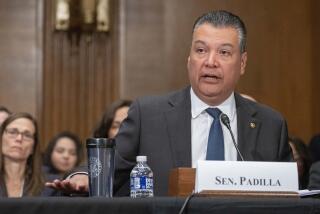Zero-down legislation stirs debate
- Share via
U.S. Rep. Patrick J. Tiberi (R-Ohio) introduced legislation in February to provide zero-down mortgage financing to first-time, low-income home buyers. The loans would be guaranteed by the Federal Housing Administration, which currently requires a 3% down payment on most loans it insures.
The proposed Zero Down Payment Act of 2004, which is making its way through the House, would enable 150,000 households to become homeowners in the first year of the program, according to the Department of Housing and Urban Development.
Critics of the proposal say the no-down-payment loans would impose added burdens on low-income home buyers in the form of higher insurance premiums. The borrowers would be charged higher premiums than those normally paid by FHA-insured homeowners. On a $100,000 loan, the additional monthly premium would be about $50.
In hearings of the House Finance Services Committee in March, Rep. David Scott (D-Georgia), said he supported the bill but emphasized the need for financial counseling to borrowers to prevent defaults and foreclosures.
Scott said if the government did not provide counseling to borrowers, “it is much like giving a man a rope on which he can either pull himself or he can hang himself.”
There’s concern that borrowers would be at greater risk of default. A Congressional Budget Office analysis of the proposal said, “On average, borrowers with less equity ... have higher default rates than borrowers with more equity. Such borrowers are more vulnerable to adverse events, such as job loss and falling house prices.”
One local mortgage broker who supports the zero-down program said he did not expect a higher foreclosure rate than with other types of FHA loans. “The underwriting will be the same, if not stricter,” said Raoul Amescua, vice president of Rancho Cucamonga-based Gold Medal Mortgage. “I feel it’s a good thing,” he added, “if you can legitimately offer a wider variety of ways for people to have homeownership.”
More to Read
Get the L.A. Times Politics newsletter
Deeply reported insights into legislation, politics and policy from Sacramento, Washington and beyond. In your inbox twice per week.
You may occasionally receive promotional content from the Los Angeles Times.










